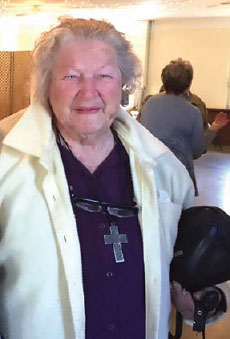
A FISH TALE:
Alberta Parkinson

Like so many people who came to Colonial Beach in their youth and wound up staying a lifetime, it was all about a man for Alberta Parkinson.
Born on November 26, 1926 in Washington, DC, Alberta first came to town to stay with her aunt and uncle who rented a cottage at the small beach town on the Potomac. On some occasions her father rented a cottage for the family from a professor at George Washington University, so throughout her childhood Alberta was a summer regular.
She remembers the boat rides and fishing trips that left from the town fishing pier every thirty minutes or so all day long, the announcements made on the loudspeaker that echoed up and down the beach and boardwalk. “It made things seem so alive,” she recalls.
There was plenty to do along the boardwalk back then. “There were two or three bingo places, a shooting gallery, snowball stands. They even had moonlight boat rides.
“I went on some of the boat rides,” she says, and remembers sitting in the stern of the boat. What she doesn’t recall is the exact moment when Walter Parkinson caught her eye…or she caught his.
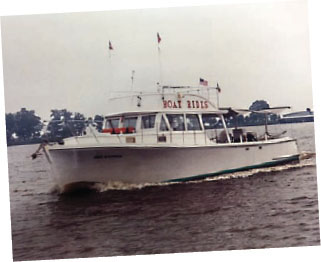
Fishing excursions at Colonial Beach
Walter, along with his father, took out fishing charters and scenic boat rides. They’d take tourists on rides over to Cobb Island and back or to other destinations on the river, pointing out the local sights. It was the Parkinson family business.
“His father was from the Eastern Shore,” Alberta recalls. As had so many others from that area who wound up in Colonial Beach, Walter’s father had met a local girl and settled in this small town that depended for much of its livelihood on the water.
At some point the tall, dark-haired girl who spent her time on a towel at the nearby beach captured Walter’s attention. He started coming up to Washington to court the young woman, who by then was working as a doctor’s assistant. He even took dance lessons at an Arthur Murray studio to impress her.
“We’d go to a dance hall on H Street, Northeast. We’d have cocktails and dinner, then go in the back for dancing,” she remembers, her eyes lighting up. “Sometimes we’d go downtown to eat, or go to the theater at the Capital Stage to see shows.”

Haines Point, Washington, DC
She remembers distinctly that on the night he proposed, they’d gone to Haines Point, with its romantic view of Washington and a place where young people congregated in their cars at night. Because she’d been summering in Colonial Beach most of her life, the thought of giving up the faster-paced lifestyle of Washington didn’t bother her a bit. She said yes.
But even after that proposal, it was a year or more before they got married in 1954, because Walter wanted to finish the house he was having built for her prior to the wedding. Local builder Jim Jett was constructing the ranch-style house on a prime piece of waterfront property facing Monroe Bay. From their living room window they were able to see the Stanford Marine Railway, where Clarence Stanford built two of Walter’s most famous wooden boats—the Big Dipper and its sister ship, the Midnight Sun. “Clarence built wonderful boats,” she says.
Alberta and Walter married in an 8:00 a.m. ceremony at Our Savior Church, just blocks from the family home in Washington. After a reception at the house, they drove south to start their lives in Colonial Beach.
She recalls that he carried her across the threshold into their new home, which was only partially furnished, then told her, “Don’t make any plans for summer. We’ll be working on the boats.”
That’s how Alberta, who doesn’t even much like fish, wound up serving as not just wife, but first mate for Walter throughout their lifetime together. “I didn’t know anything about boats or fishing,” she says. Though her tone is wry, there’s also an unmistakable love in her voice for this man who’s never far from her thoughts. Even after his death, when others were serving as captain of the Big Dipper, she continued to carry bait across the street in the early morning haze and to continue her role as first mate on those Big Dipper fishing charters until she finally sold the boat just a few years ago.
If the charter fishing and boat rides weren’t enough to keep the young couple busy, Walter also bought a bathhouse and snowball stand on the boardwalk and turned them over to Alberta to run. “He had the bathhouse building rebuilt, put in dressing rooms. People would put their clothes in bags and we’d keep them on a shelf while they were on the beach.” She had a frozen custard machine, too. “I wouldn’t get home until eleven or twelve at night.”
She doesn’t recall there being any trouble on the boardwalk back then. “Captain Joe Miller was the only policeman. He walked everywhere. He’d stop somebody and say, ‘You’re drunk. Go home.’ And they would. He didn’t stay up too late,” she remembers.
Because she and Walter had always been connected by a love of music and dancing, they didn’t miss the big bands that performed at Reno, especially Guy Lombardo. “I walked up. He was on the bandstand. He was very nice, very polite. I got his autograph. Walter wouldn’t have had the nerve to do that.”
Though they bought a condo in the busier and faster-paced Ocean City, Maryland, and enjoyed visiting there, Colonial Beach was home.
“There are very few things I’d change,” Alberta says. “We had a good life here.”
They raised one son, who died of cancer as a young adult. There’s a plaque on the wall in the children’s section of the local library in memory of Walter Albert “Bert” Parkinson. “He would work on the boat if Walter needed him, but he wasn’t crazy about it,” she recalls, then picks up a photo cube of snapshots of the young man she lost too soon.
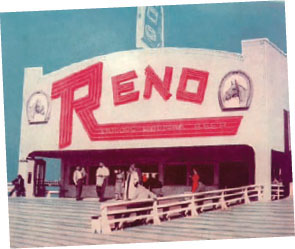
Reno Casino
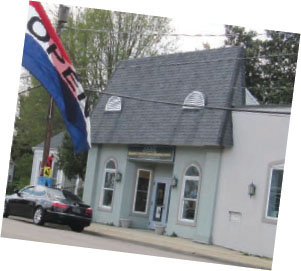
Cooper Branch of Central Rappahannock Regional Library
“I kept thinking God was going to heal my son, but He had other plans,” she says, her voice still filled with sorrow.
Having a child gave Alberta yet another purpose. “He had plenty of books to read because I saw to it,” she declares. And because of that determination, she also saw to it that the town worked toward getting its own library.
“The bookmobile came first, then the library. An elderly woman had a lot of books and she donated them.” Because Alberta was also an active volunteer at St. Mary’s Episcopal Church, the church found two rooms that could be used to house the growing collection of donated books. It became the library’s first location. Then the town was able to give them space in what had once been Greenlaw’s Hardware Store on Hawthorn Street.
But Alberta and her friend Bobbi Cooper, whose family had owned Cooper’s store on a large piece of property on Washington Avenue, wanted even more. Working with the town and that piece of donated property, they built what is now the Cooper Branch of the Central Rappahannock Regional Library System, which is connected to other libraries in nearby Fredericksburg and throughout the Northern Neck Region.
Alberta has a few other passions in her life. Clark Gable is one and there are photos of him on the walls of her home. She also loves old carousel horses and one sits now in a prime location where she can enjoy it every day, right along with the view of the bay. That view and the mementos of her years with Walter surround her with memories of the two men in her life.
“Not a day goes by that I don’t wish they were still here,” she says softly, glancing up at a picture of Walter that hangs above the sofa. “Not a day.”
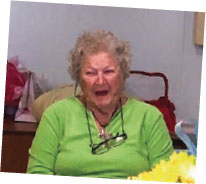
Alberta Parkinson